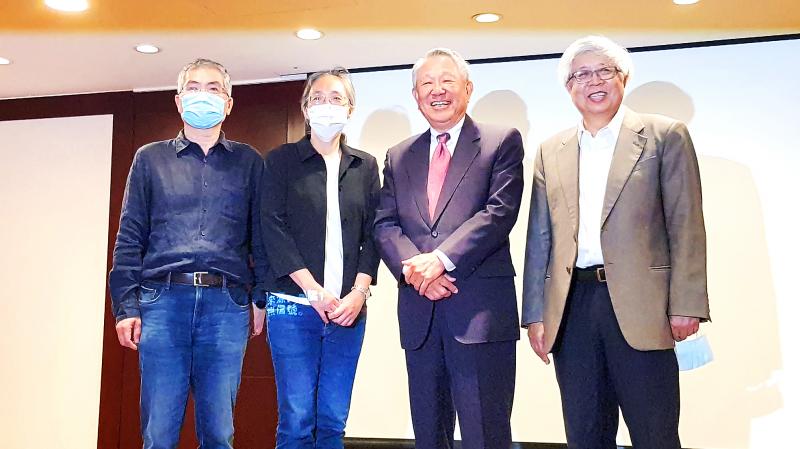Vaccine maker Adimmune Corp (國光生技) yesterday said it plans to start in August phase I clinical trials of its COVID-19 vaccine candidate, which effectively inhibited the growth of the novel coronavirus in preliminary animal tests last month.
Adimmune told a news conference in Taipei that it had designed and produced four prototypes of antigens to fight the virus based on its recombinant protein technology, and last month tested one prototype in a biosafety level 3 (BSL-3) lab at National Taiwan University (NTU).
After injecting the antigen into a few mice and seeing them generate antibodies, Adimmune extracted their plasma and placed it in another cell as well as the novel coronavirus to test the outcome, the company said.

Photo: Chien Hui-ju, Taipei Times
“The tests showed that the antibodies could inhibit the growth of the novel coronavirus and remained fully capable with a dilution of 1:640,” NTU Department of Clinical Laboratory Sciences and Medical Biotechnology professor Chang Sui-yuan (張淑媛) said.
The inhibition rate remained above 80 percent with a dilution of 1:1280, attesting to the strong effect of the vaccine candidate, Adimmune chairman Steve Chan (詹啟賢) said, adding that a flu vaccine is regarded as effective if its inhibition rate is higher than 80 percent with a dilution of 1:320.
The virus tested was from an isolated strain with the highest toxicity among NTU’s more than 20 isolated virus strains, Chang said.
“The tests gave us encouraging results and we feel confident. However, given that the novel coronavirus mutates, we need to run tests on more virus strains to see if the candidate will work against most of them,” she said.
The lab spent about one month setting up protocols and conducting tests, she added.
Adimmune does not know how long the vaccine candidate can protect humans from the virus, but would find out the answers in the clinical trials, Chan said.
The firm on Tuesday began the second stage of animal tests to see if the vaccine candidate would endanger mice and plans to complete the tests in October, he said.
While most vaccine developers have to wait for animal tests to be completed and for the results to be confirmed before moving on to human tests, Adimmune plans to expedite the process by applying to conduct human trials in August, Chan said.
Like other foreign regulators worldwide, Taiwan’s Food and Drug Administration has launched emergency use authorizations programs to speed up the development of a treatment for COVID-19, he said.
Adimmune has been included in the agency’s program and would be granted priority when applying for reviews or clinical trials, the company said.
After completing the animal tests’ interim analysis to make sure its candidate is safe, Adimmune would apply to conduct phase I clinical trials in August, and commence phase II and phase III trials in the first quarter next year, Chan said.
“We have to take some risks here for if the animal tests turn up negative, the phase I trial will have to stop,” he said.
The company’s goal is to start mass production of the vaccines in December if it gains approval of an emergency use authorization by the Taiwanese regulators, before gaining marketing approval next year, he said.

The US dollar was trading at NT$29.7 at 10am today on the Taipei Foreign Exchange, as the New Taiwan dollar gained NT$1.364 from the previous close last week. The NT dollar continued to rise today, after surging 3.07 percent on Friday. After opening at NT$30.91, the NT dollar gained more than NT$1 in just 15 minutes, briefly passing the NT$30 mark. Before the US Department of the Treasury's semi-annual currency report came out, expectations that the NT dollar would keep rising were already building. The NT dollar on Friday closed at NT$31.064, up by NT$0.953 — a 3.07 percent single-day gain. Today,

‘SHORT TERM’: The local currency would likely remain strong in the near term, driven by anticipated US trade pressure, capital inflows and expectations of a US Fed rate cut The US dollar is expected to fall below NT$30 in the near term, as traders anticipate increased pressure from Washington for Taiwan to allow the New Taiwan dollar to appreciate, Cathay United Bank (國泰世華銀行) chief economist Lin Chi-chao (林啟超) said. Following a sharp drop in the greenback against the NT dollar on Friday, Lin told the Central News Agency that the local currency is likely to remain strong in the short term, driven in part by market psychology surrounding anticipated US policy pressure. On Friday, the US dollar fell NT$0.953, or 3.07 percent, closing at NT$31.064 — its lowest level since Jan.

The New Taiwan dollar and Taiwanese stocks surged on signs that trade tensions between the world’s top two economies might start easing and as US tech earnings boosted the outlook of the nation’s semiconductor exports. The NT dollar strengthened as much as 3.8 percent versus the US dollar to 30.815, the biggest intraday gain since January 2011, closing at NT$31.064. The benchmark TAIEX jumped 2.73 percent to outperform the region’s equity gauges. Outlook for global trade improved after China said it is assessing possible trade talks with the US, providing a boost for the nation’s currency and shares. As the NT dollar

The Financial Supervisory Commission (FSC) yesterday met with some of the nation’s largest insurance companies as a skyrocketing New Taiwan dollar piles pressure on their hundreds of billions of dollars in US bond investments. The commission has asked some life insurance firms, among the biggest Asian holders of US debt, to discuss how the rapidly strengthening NT dollar has impacted their operations, people familiar with the matter said. The meeting took place as the NT dollar jumped as much as 5 percent yesterday, its biggest intraday gain in more than three decades. The local currency surged as exporters rushed to